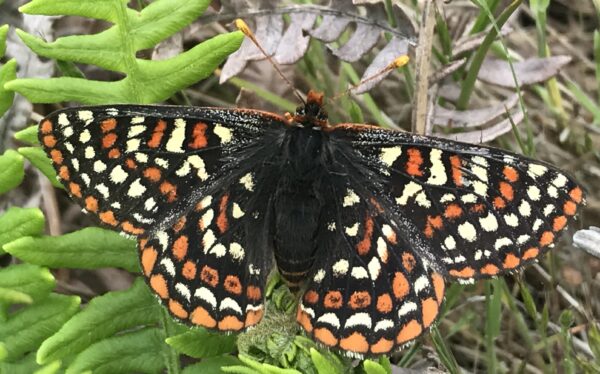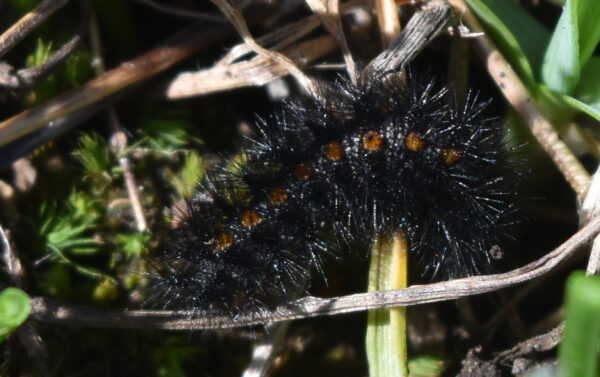Helping Butterflies and Other Species in Helliwell
By Chris Junck, Taylor’s Checkerspot Butterfly Recovery Project Team

Taylor’s checkerspot butterfly. Photo by Jennifer Heron.
Have you ever seen a Taylor’s checkerspot butterfly? If not, you’re not alone. This critically endangered species disappeared from Hornby Island and most of its Canadian range by the late 1990s. Fortunately, populations of these dazzling orange, black and white checkered butterflies were discovered on Denman Island in 2005 and near Campbell River in 2018.
The odds of seeing Taylor’s checkerspot caterpillars and butterflies in Helliwell Provincial Park will significantly increase this spring. In March, approximately 5,000 larvae reared at the Greater Vancouver Zoo, with the support of Wildlife Preservation Canada staff, will be gently placed in the park by the Taylor’s Checkerspot Butterfly Recovery Project Team with assistance from community volunteers and others. This follows the first release of almost 800 Taylor’s checkerspot larvae in Helliwell’s coastal bluff meadow in 2020 and about 1,300 last year.

Taylor’s checkerspot butterfly caterpillar. Photo by Chris Junck.
The next few weeks will be a crucial time for butterflies. Trampling is a key threat for caterpillars and their food plants. “We have invested a lot of time and resources in this project, so we are asking Helliwell’s visitors to please stay on the trails that are delineated by ropes and restoration area signs and keep your dogs on leashes,” said Jennifer Heron, Chair of the Taylor’s Checkerspot Butterfly Recovery Project Team and invertebrate conservation specialist for the B.C. Ministry of Environment and Climate Change Strategy.
Visitors are reminded that dogs must be on a leash according to provincial park regulations and bikes aren’t allowed in this park. Also, please do not move or pick up Taylor’s checkerspots. Instead, report sightings to Taylors.Checkerspot@gov.bc.ca, or by using the free iNaturalist app (www.inaturalist.org). It’s an easy-to-use species identification tool that enables citizen scientists to record and contribute important species data for projects around the globe.
The recovery initiative required extensive habitat restoration in the park, such as selective tree and invasive plant removal, and adding native plants and seeds. Although focused on Taylor’s checkerspot butterflies, several other at-risk and uncommon coastal bluff species benefit from this project, such as dun skipper butterflies and about a dozen other range-restricted butterflies, western bumble bee, bats, western screech-owl, and numerous other birds and plants.
The Taylor’s Checkerspot Butterfly Recovery Project Team includes representatives from BC Ministry of Environment and Climate Change Strategy, BC Parks, biological consultants, Denman Conservancy Association, Garry Oak Ecosystems Recovery Team, Greater Vancouver Zoo, Mosaic Forest Management, Wildlife Preservation Canada, and others. There has also been a lot of local assistance for the project from Helliwell Park neighbours in High Salal Ranch Strata, volunteers, Conservancy Hornby Island, the Hornby Island Natural History Centre, and Hornby Island Provincial Parks Committee. The Taylor’s Checkerspot Butterfly Recovery Project Team and BC Parks thank the Cowichan Tribes, Halalt, Homalco, K’ómoks, Lake Cowichan, Lyackson, Penelakut, Qualicum, Snaw’Naw’As, Stz’uminus, Tla’amin, We Wai Kai, and We Wai Kum First Nations, for allowing us to restore ecosystems in their traditional territories.
The recovery project has benefited from funding and in-kind contributions from the Habitat Conservation Trust Foundation, the BC Parks License Plate Program, the Environment Canada Habitat Stewardship Fund and others.